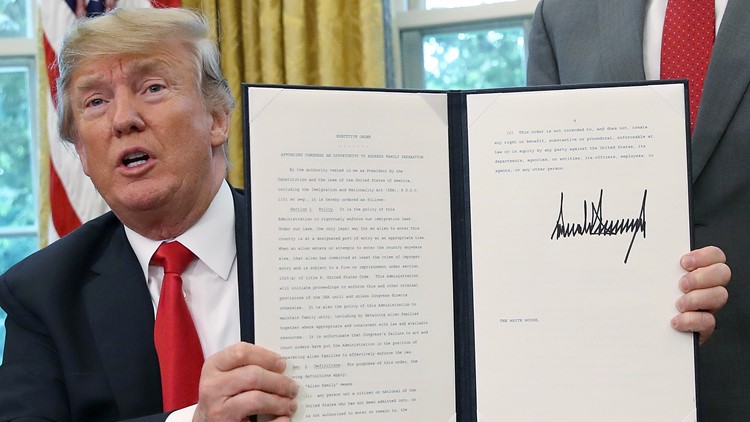President Donald Trump signed an executive order that will stop the separation of children from their parents at the border on Wednesday.
Here are the key takeaways:
The order stops the separation of children from their parents but does not end the "zero tolerance" policy
In the executive order, President Trump emphasizes that the administration will continue strict enforcement of immigration laws. If an immigrant enters the country illegally, they will be prosecuted.
"We're going to have strong, very strong borders, but we're going to keep the families together," said Trump who said he didn't like the "sight" or "feeling" of children separated from their parents.
Families will be detained together in places with available resources
In order to prevent family separation, families will be detained together "where appropriate and consistent with law and available resources." It is unclear what will happen to the families if there aren't available resources to house them.
Families could be housed on military bases
The Department of Homeland Security is the main government agency that is responsible for housing the families. But they could ask other government agencies to help house families in their facilities.
According to the executive order, the Department of Defense will have to provide housing for families on military bases if the Homeland Security Secretary so requests. The Department of Defense could also be asked to construct facilities for families if necessary.
Other government agencies could also be required to provide housing and care for families. The DHS will reimburse the agencies that provide housing.
Some legal issues still need to be worked out
The "Flores agreement," a 1997 federal court case, limited how long the government could keep children in immigration detention. The government currently can't hold accompanied children in custody for more than 20 days.
Given the current backlog in the courts and the many pending cases, it is likely to take more than 20 days for families' cases to be resolved.
So the executive order states that the Attorney General will "promptly" file a request with the U.S. District Court for the Central District of California to modify the settlement agreement in Flores v. Sessions.
White House continues to blame Congress for separating families
In the past few days, members of the Trump administration have continuously blamed Congress for separating families. The executive order includes a statement on that issue: "It is unfortunate that Congress’s failure to act and court orders have put the Administration in the position of separating alien families to effectively enforce the law."
Here's what was left out of the executive order
Many questions about family separation at the border have been left unanswered. It's still unclear what will happen to families that have already been separated. Will they be reunified, and how long would that process take?
______________
Read the full executive order below:
Affording Congress an Opportunity to Address Family Separation
By the authority vested in me as President by the Constitution and the laws of the United States of America, including the Immigration and Nationality Act (INA), 8 U.S.C. 1101 et seq., it is hereby ordered as follows:
Section 1. Policy. It is the policy of this Administration to rigorously enforce our immigration laws. Under our laws, the only legal way for an alien to enter this country is at a designated port of entry at an appropriate time. When an alien enters or attempts to enter the country anywhere else, that alien has committed at least the crime of improper entry and is subject to a fine or imprisonment under section 1325(a) of title 8, United States Code. This Administration will initiate proceedings to enforce this and other criminal provisions of the INA until and unless Congress directs otherwise. It is also the policy of this Administration to maintain family unity, including by detaining alien families together where appropriate and consistent with law and available resources. It is unfortunate that Congress’s failure to act and court orders have put the Administration in the position of separating alien families to effectively enforce the law.
Sec. 2. Definitions. For purposes of this order, the following definitions apply:
(a) “Alien family” means
(i) any person not a citizen or national of the United States who has not been admitted into, or is not authorized to enter or remain in, the United States, who entered this country with an alien child or alien children at or between designated ports of entry and who was detained; and
(ii) that person’s alien child or alien children.
(b) “Alien child” means any person not a citizen or national of the United States who
(i) has not been admitted into, or is not authorized to enter or remain in, the United States;
(ii) is under the age of 18; and
(iii) has a legal parent-child relationship to an alien who entered the United States with the alien child at or between designated ports of entry and who was detained.
Sec. 3. Temporary Detention Policy for Families Entering this Country Illegally. (a) The Secretary of Homeland Security (Secretary), shall, to the extent permitted by law and subject to the availability of appropriations, maintain custody of alien families during the pendency of any criminal improper entry or immigration proceedings involving their members.
(b) The Secretary shall not, however, detain an alien family together when there is a concern that detention of an alien child with the child’s alien parent would pose a risk to the child’s welfare.
(c) The Secretary of Defense shall take all legally available measures to provide to the Secretary, upon request, any existing facilities available for the housing and care of alien families, and shall construct such facilities if necessary and consistent with law. The Secretary, to the extent permitted by law, shall be responsible for reimbursement for the use of these facilities.
(d) Heads of executive departments and agencies shall, to the extent consistent with law, make available to the Secretary, for the housing and care of alien families pending court proceedings for improper entry, any facilities that are appropriate for such purposes. The Secretary, to the extent permitted by law, shall be responsible for reimbursement for the use of these facilities.
(e) The Attorney General shall promptly file a request with the U.S. District Court for the Central District of California to modify the Settlement Agreement in Flores v. Sessions, CV 85-4544 (“Flores settlement”), in a manner that would permit the Secretary, under present resource constraints, to detain alien families together throughout the pendency of criminal proceedings for improper entry or any removal or other immigration proceedings.
Sec. 4. Prioritization of Immigration Proceedings Involving Alien Families. The Attorney General shall, to the extent practicable, prioritize the adjudication of cases involving detained families.
Sec. 5. General Provisions. (a) Nothing in this order shall be construed to impair or otherwise affect:
(i) the authority granted by law to an executive department or agency, or the head thereof; or
(ii) the functions of the Director of the Office of Management and Budget relating to budgetary, administrative, or legislative proposals.
(b) This order shall be implemented in a manner consistent with applicable law and subject to the availability of appropriations.
(c) This order is not intended to, and does not, create any right or benefit, substantive or procedural, enforceable at law or in equity by any party against the United States, its departments, agencies, or entities, its officers, employees, or agents, or any other person.
DONALD J. TRUMP



